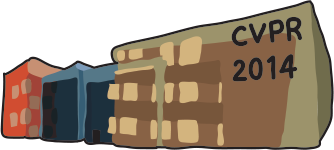-
Iterative Multilevel MRF Leveraging Context and Voxel Information for Brain Tumour Segmentation in MRI
AbstractIn this paper, we introduce a fully automated multistage graphical probabilistic framework to segment brain tumours from multimodal Magnetic Resonance Images (MRIs) acquired from real patients. An initial Bayesian tumour classification based on Gabor texture features permits subsequent computations to be focused on areas where the probability of tumour is deemed high. An iterative, multistage Markov Random Field (MRF) framework is then devised to classify the various tumour subclasses (e.g. edema, solid tumour, enhancing tumour and necrotic core). Specifically, an adapted, voxel-based MRF provides tumour candidates to a higher level, regional MRF, which then leverages both contextual texture information and relative spatial consistency of the tumour subclass positions to provide updated regional information down to the voxel-based MRF for further local refinement. The two stages iterate until convergence. Experiments are performed on publicly available, patient brain tumour images from the MICCAI 2012 [11] and 2013 [12] Brain Tumour Segmentation Challenges. The results demonstrate that the proposed method achieves the top performance in the segmentation of tumour cores and enhancing tumours, and performs comparably to the winners in other tumour categories.
Related Material
[pdf][bibtex]@InProceedings{Subbanna_2014_CVPR,
author = {Subbanna, Nagesh and Precup, Doina and Arbel, Tal},
title = {Iterative Multilevel MRF Leveraging Context and Voxel Information for Brain Tumour Segmentation in MRI},
booktitle = {Proceedings of the IEEE Conference on Computer Vision and Pattern Recognition (CVPR)},
month = {June},
year = {2014}
}
These CVPR 2014 papers are the Open Access versions, provided by the Computer Vision Foundation.
Except for the watermark, they are identical to the accepted versions; the final published version of the proceedings is available on IEEE Xplore.
Except for the watermark, they are identical to the accepted versions; the final published version of the proceedings is available on IEEE Xplore.
This material is presented to ensure timely dissemination of scholarly and technical work.
Copyright and all rights therein are retained by authors or by other copyright holders.
All persons copying this information are expected to adhere to the terms and constraints invoked by each author's copyright.

